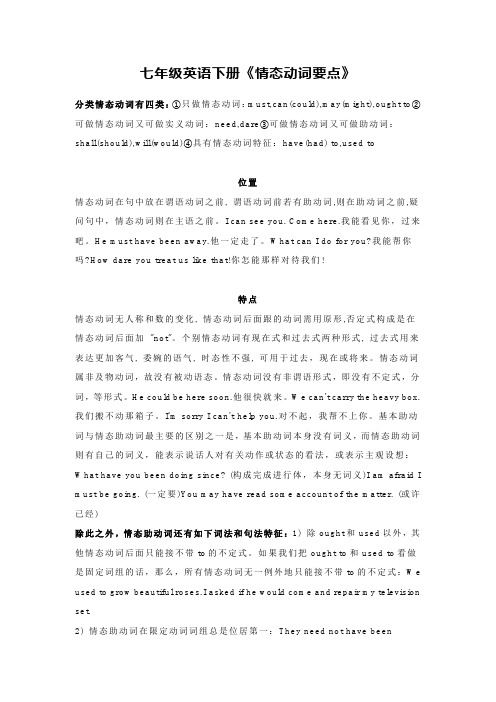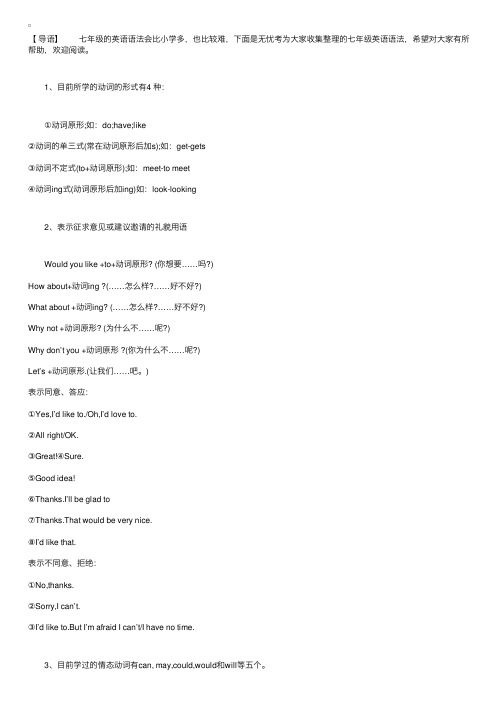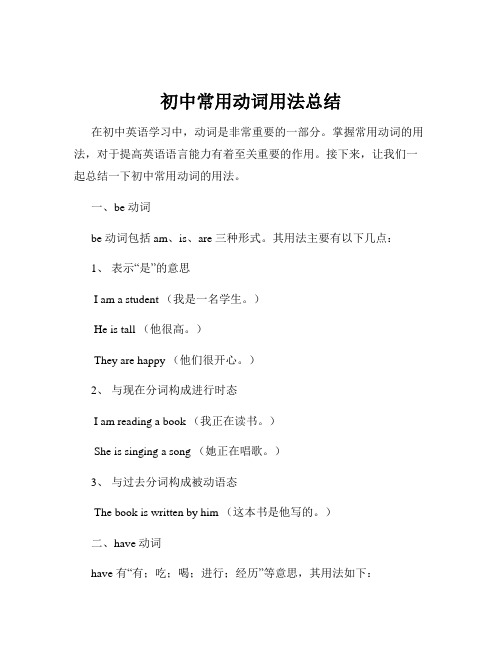七年级下册英语动词用法归类
初一动词用法

初一动词用法对于初一的同学来说,掌握动词的用法是英语学习中的一个重要环节。
动词在句子中起着关键的作用,它不仅能够表达动作,还能反映时态、语态和语气等。
下面,咱们就来详细说一说初一阶段常见的动词用法。
首先,咱们得了解动词的基本分类。
动词可以分为实义动词、系动词、助动词和情态动词。
实义动词是表示具体动作的词,比如“run(跑)”“eat(吃)”“read (读)”等等。
实义动词又可以分为及物动词和不及物动词。
及物动词后面可以直接跟宾语,像“eat an apple(吃一个苹果)”中的“eat”就是及物动词,“apple”就是宾语。
而不及物动词后面不能直接跟宾语,如果要加宾语,得先加上介词,比如“look at the blackboard(看黑板)”中的“look”就是不及物动词,要加上“at”才能跟宾语“the blackboard”。
系动词呢,它主要是用来连接主语和表语,说明主语的状态、性质、特征等。
初一常见的系动词有“be(am/is/are)”“look(看起来)”“sound(听起来)”“taste(尝起来)”“feel(感觉起来)”等等。
比如“She is happy(她很开心。
)”“The music sounds nice(这音乐听起来不错。
)”助动词主要是用来帮助构成各种时态、语态和语气。
初一阶段常见的助动词有“do/does”“have/has”。
“do/does”用于一般现在时的否定句和疑问句中,比如“Don't eat in class(不要在课堂上吃东西。
)”“Does he like sports?(他喜欢运动吗?)”“have/has”用于现在完成时,比如“I have finished my homework(我已经完成了我的作业。
)”情态动词表示说话人的语气和态度,常见的有“can(能,会)”“could(能,会,是 can 的过去式)”“may(可以)”“might(可以,是 may 的过去式)”“must(必须)”等。
七年级英语下册《情态动词要点》

七年级英语下册《情态动词要点》分类情态动词有四类:①只做情态动词:must,can(could),may(might),ought to②可做情态动词又可做实义动词:need,dare③可做情态动词又可做助动词:shall(should),will(would)④具有情态动词特征:have(had) to,used to位置情态动词在句中放在谓语动词之前, 谓语动词前若有助动词,则在助动词之前,疑问句中,情态动词则在主语之前。
I can see you. Come here.我能看见你,过来吧。
He must have been away.他一定走了。
What can I do for you?我能帮你吗?How dare you treat us like that!你怎能那样对待我们!特点情态动词无人称和数的变化, 情态动词后面跟的动词需用原形,否定式构成是在情态动词后面加"not"。
个别情态动词有现在式和过去式两种形式, 过去式用来表达更加客气, 委婉的语气, 时态性不强, 可用于过去,现在或将来。
情态动词属非及物动词,故没有被动语态。
情态动词没有非谓语形式,即没有不定式,分词,等形式。
He could be here soon.他很快就来。
We can't carry the heavy box.我们搬不动那箱子。
I'm sorry I can't help you.对不起,我帮不上你。
基本助动词与情态助动词最主要的区别之一是,基本助动词本身没有词义,而情态助动词则有自己的词义,能表示说话人对有关动作或状态的看法,或表示主观设想:What have you been doing since? (构成完成进行体,本身无词义)I am afraid I must be going. (一定要)You may have read some account of the matter. (或许已经)除此之外,情态助动词还有如下词法和句法特征:1) 除ought和used以外,其他情态动词后面只能接不带to的不定式。
七年级英语语法大全(动词、名词所有格,一般现在时)

七年级英语语法大全(动词、名词所有格,一般现在时)一. 动词be(is,am,are)的用法我(I)用am, 你(you)用are,is跟着他(he)、她(she)、它(it)。
单数名词用is,复数名词全用are。
变否定,更容易,be后not加上去。
变疑问,往前提,句末问号莫丢弃。
还有一条须注意,句首大写莫忘记。
二. 不定冠词a和ana和an都是不定冠词,表示一(个,支,本,块……)的意思,但不强调数量概念,而是强调类别,用来限定名词。
a用在辅音音素开头的单数名词前,如:a pencil(一支铅笔),a book(一本书);an用在元音音素开头的名词前,如an eraser(一块橡皮)。
如果名词前有修饰语,用a还是用an,则以该修饰语的第一音素决定用a还是用an。
如:a clock 一座钟an old clock 一座旧钟a book 一本书an English book 一本英语书a nice apple 一个可爱的苹果an apple 一个苹果三. this,that和it用法(1)this和that是指示代词,it是人称代词。
(2)距离说话人近的人或物用this, 距离说话人远的人或物用that。
如:This is a flower. 这是一朵花。
(近处)That is a tree. 那是一棵树。
(远处)(3)放在一起的两样东西,先说this, 后说that。
如:This is a pen. That is a pencil. 这是一支钢笔。
那是一支铅笔。
(4)向别人介绍某人时说This is…, 不说That is…。
如:This is Helen. Helen, this is Tom. 这是海伦。
海伦,这是汤姆。
(5)This is 不能缩写, 而That is可以缩写。
如:This is a bike. That’s a car. 这是一辆自行车。
那是一辆轿车。
(6)打电话时,介绍自己用this, 询问对方用that。
初中英语动词用法分类

初中英语动词用法分类在初中英语的学习中,动词是至关重要的一部分。
掌握动词的用法,对于理解句子结构、准确表达意思以及提升英语语言能力都有着关键作用。
接下来,让我们一起对初中英语动词的用法进行分类和探讨。
一、实义动词实义动词是表示具体动作或状态的动词,能够独立作谓语。
1、及物动词及物动词后面需要接宾语,才能完整地表达一个动作。
例如,“I love English” 中的“love”就是及物动词,“English”是它的宾语。
常见的及物动词有“eat”(吃)、“read”(读)、“write”(写)等。
2、不及物动词不及物动词后面不需要接宾语就能表达完整的意思。
比如,“The bird flies” 中的“flies”就是不及物动词。
常见的不及物动词有“come”(来)、“go”(去)、“sleep”(睡觉)等。
二、系动词系动词用于连接主语和表语,表示主语的身份、性质、状态等。
常见的系动词有:1、 be 动词(am/is/are/was/were)这是最常见的系动词,例如,“I am a student”2、感官动词如 look(看起来)、sound(听起来)、smell(闻起来)、taste (尝起来)、feel(感觉起来)。
例如,“The flower smells sweet”3、表示变化的动词如 become(变得)、get(变得)、grow(生长,变得)、turn(变得)等。
比如,“It gets colder and colder”三、助动词助动词主要用于构成各种时态、语态、语气等。
常见的助动词有:1、 do/does/did用于一般现在时和一般过去时的否定句和疑问句中。
例如,“Do you like music?” “He doesn't like sports” “Did she go to the party?”2、 have/has/had用于构成现在完成时和过去完成时。
如,“I have finished my homework” “They had left before I arrived”3、 be 动词(am/is/are/was/were)用于进行时态和被动语态。
初一英语常见动词用法

初一英语常见动词用法在初一英语的学习中,动词是非常重要的一部分。
掌握常见动词的用法,对于我们正确理解和运用英语句子至关重要。
接下来,让我们一起了解一些初一英语中常见动词的用法。
一、be 动词(am/is/are)be 动词可以说是英语中最基础、最常用的动词之一了。
“am”用于第一人称单数“ I ”,例如:“I am a student ”(我是一名学生。
)“is”用于第三人称单数,比如:“He is tall ”(他很高。
)“She is my friend ”(她是我的朋友。
)“The book is interesting ”(这本书很有趣。
)“are”用于第二人称单数“you”以及复数人称,像:“You are nice ”(你很好。
)“We are happy ”(我们很开心。
)“They are in the classroom ”(他们在教室里。
)在使用 be 动词时,要注意主语的人称和单复数,保持一致。
二、have/has“have”表示“有”,用于第一人称(I、we)、第二人称(you)以及复数人称(they 等)。
例如:“I have a pen ”(我有一支笔。
)“They have many books ”(他们有很多书。
)“has”则用于第三人称单数(he、she、it),比如:“He has a dog ”(他有一只狗。
)“She has a beautiful dress ”(她有一条漂亮的裙子。
)三、like“like”意思是“喜欢”,常见的用法有:1、 like +名词,例如:“I like apples ”(我喜欢苹果。
)2、 like + doing sth ,表示喜欢做某事,强调习惯和爱好,比如:“He likes playing football ”(他喜欢踢足球。
)3、 like + to do sth ,表示偶尔或具体某次喜欢做某事,例如:“She likes to swim today ”(她今天喜欢游泳。
七年级英语语法归纳

【导语】 七年级的英语语法会⽐⼩学多,也⽐较难,下⾯是⽆忧考为⼤家收集整理的七年级英语语法,希望对⼤家有所帮助,欢迎阅读。
1、⽬前所学的动词的形式有4 种: ①动词原形;如:do;have;like②动词的单三式(常在动词原形后加s);如:get-gets③动词不定式(to+动词原形);如:meet-to meet④动词ing式(动词原形后加ing)如:look-looking 2、表⽰征求意见或建议邀请的礼貌⽤语 Would you like +to+动词原形? (你想要……吗?)How about+动词ing ?(……怎么样?……好不好?)What about +动词ing? (……怎么样?……好不好?)Why not +动词原形? (为什么不……呢?)Why don’t you +动词原形 ?(你为什么不……呢?)Let’s +动词原形.(让我们……吧。
)表⽰同意、答应:①Yes,I’d like to./Oh,I’d love to.②All right/OK.③Great!④Sure.⑤Good idea!⑥Thanks.I’ll be glad to⑦Thanks.That would be very nice.⑧I’d like that.表⽰不同意、拒绝:①No,thanks.②Sorry,I can’t.③I’d like to.But I’m afraid I can’t/I have no time. 3、⽬前学过的情态动词有can, may,could,would和will等五个。
学好情态动词必须把握三个⽤法:①后必须跟动词原形 ;②没有三单式(其后不能加s);③可以把情态动词提到句⾸构成疑问句;可以在情态动词后⾯加上not构成否定句。
4、⽬前学过的后跟动词不定式(to+动词原形)的有: ①would like to+动词原形(想要做某事);want to+动词原形(想要做某事);②forget to+动词原形(忘记要做某事);③like to +动词原形(喜欢做某事);love to +动词原形(喜欢做某事)④ask sb. to +动词原形.(请/叫某⼈做某事)tell sb. to +动词原形.(告诉/叫某⼈做某事)would like sb. to +动词原形.(想叫某⼈做某事)want sb. to +动词原形.(想叫某⼈做某事)⑤have to +动词原形(必须/不得不做某事)⑥Nice/Glad/happy to +动词原形(很⾼兴做某事)如:Nice to meet you.I’m glad to be here. 5、⽬前学过的后跟动词原形的有: ①情态动词:can,may,could,would,will后;②助动词do,don’t,does,doesn’t后(does,doesn’t⼀出现,三单式要滚蛋); ③动词please(请)后:如:Please tell him about the picnic.④短语Why not…/Why don’t you…后;⑤动词let 后;如:Let Jane help you. Let’s go home.⑥动词help后,也可带to;如:Let’s help Maria (to) carry water.⑦祈使句以动词原形开头,如:Have a seat , please.请坐下。
人教版英语七年级下册unit1+2核心考点归纳(语法+词汇+短语+重点句子)

人教版七年级下册unit1+2核心考点及语法归纳【unit 1语法】一、情态动词can的基本用法情态动词can有一定的词义,但不能独立存在,它必须与动词原形一起构成谓语。
can没有人称和数的变化。
其具体用法如下:1.表示"能、会",指脑力或体力方面的"能力"。
例如:I can speak English.我会讲英语。
Jim can swim but I can't.吉姆会游泳,但我不会。
2.表示"可能",常用于否定句或疑问句中,指某种可能性。
例如:Han Mei can't be in the classroom.韩梅不可能在教室里。
Can he come here today, please?请问他今天能到这里来吗?3.表示"可以",常用于口语中,指许可或请求做某事。
例如:Can I have a cup of tea, please?请问我可以喝一杯茶吗?You can go out.你可以出去了?二、情态动词的注意事项1. can的口诀:情态动词can、can、can,动词原形跟后面。
变疑问can提前,变否定not后面加上去。
主语人称单复数,情态动词不能变。
2. 情态动词can可以引导肯定句和疑问句。
肯定句:主语+ can + 动词原形+ 其他成分疑问句:can + 主语+ 动词原形+ 其他成分3.can 引导的肯定句变为疑问句的方法:(一调二改三问号)can 提前,首字母大写。
(一调)肯定句中主语在变成疑问句时的变化。
(二改)如:肯定句:You can feed the animals.你可以喂动物。
疑问句:Can I feed the animals?我能喂动物吗?在句尾后面加问号。
(三问号)4. Can的一般疑问句回答:肯定回答:Yes,主语(必须人称代词)+ can.否定回答:No,主语(必须人称代词)+ can not (can’t)/mustn’t. Yes 或no 后要使用逗号,除了I 以外,其他人称都要小写。
初中常用动词用法总结

初中常用动词用法总结在初中英语学习中,动词是非常重要的一部分。
掌握常用动词的用法,对于提高英语语言能力有着至关重要的作用。
接下来,让我们一起总结一下初中常用动词的用法。
一、be 动词be 动词包括 am、is、are 三种形式。
其用法主要有以下几点:1、表示“是”的意思I am a student (我是一名学生。
)He is tall (他很高。
)They are happy (他们很开心。
)2、与现在分词构成进行时态I am reading a book (我正在读书。
)She is singing a song (她正在唱歌。
)3、与过去分词构成被动语态The book is written by him (这本书是他写的。
)二、have 动词have 有“有;吃;喝;进行;经历”等意思,其用法如下:1、表示“有”I have a pen (我有一支笔。
)They have many friends (他们有很多朋友。
)2、表示“吃;喝”Have some bread (吃点面包。
)Have a cup of tea (喝杯茶。
)3、与过去分词构成完成时态I have finished my homework (我已经完成了作业。
)三、do 动词do 用作实义动词时,表示“做;干”,用作助动词时,用于构成疑问句和否定句。
1、实义动词Do your homework (做你的作业。
)She does the dishes (她洗碗。
)2、助动词Do you like English? (你喜欢英语吗?)I don't know (我不知道。
)四、make 动词make 常见的意思有“制作;使;让”。
1、表示“制作”Make a cake (做一个蛋糕。
)2、表示“使;让”Make me happy (让我开心。
)五、take 动词take 有“拿;取;带走;花费”等意思。
1、表示“拿;取”Take this book (拿这本书。
- 1、下载文档前请自行甄别文档内容的完整性,平台不提供额外的编辑、内容补充、找答案等附加服务。
- 2、"仅部分预览"的文档,不可在线预览部分如存在完整性等问题,可反馈申请退款(可完整预览的文档不适用该条件!)。
- 3、如文档侵犯您的权益,请联系客服反馈,我们会尽快为您处理(人工客服工作时间:9:00-18:30)。
want to do sth想要做某事I want to be a teacher./ He wants to have milk for breakfast.want sb to do sth想要某人做某事My mother wants me to clean the room.want sth想要某物I want an apple.喜欢做某事I like playing football.like to do sth喜欢做某事He likes to go shopping with his friends.喜欢某物I like apples.喜爱做某事My brother enjoys playing football.喜爱/某物I enjoyed my winter vacation.愉快地做某事I had great fun playing in the water.=have a good time doing sth = I had a good time playing in the water.= I enjoyed myself playing in the water.让某人做某事Lucy lets me go shopping with her.让某人不做某事My mother lets me not play on the road.告诉某人去做某事Tom tells me to work hard.tell sb not to do sth告诉某人不要去做某事Tom tells me not to play every day.tell sb about sth告诉某人关于某事My math teacher tells us about the exam.告诉某人某事My friend told me the traffic accident.希望去做某事I hope to go to Beijing on summer vacation.从句希望…… I hope you have a good trip.形容词+of sb to do sth某人做某事真是太…… It’s kind of you to help me.形容词+for sb to do sth做某事对某人来说……It’s good for you to have vegetables every day.对做某事很感兴趣Lucy is interested in dancing.interested in sth做某事/某物很感兴趣My parents are interested in Beijing Opera.对某人很友好My classmates are friendly to me.和某人很友好My classmates are friendly with each other.等待某人Jeff often waits for his sister after school.迫不及待去做某事Summer is coming , I can’t wait to go to swim.为……而工作Do you want to work for a magazine?work as从事……职业My father works as a doctor.和……一起工作Do you like to work with other young people?忙于做某事My mother is busy doing housework every day.忙于某事/某物Every student is busy with study.教某人做某事My English teacher teaches me to study English.教某人某事/某物My English teacher teaches me study.感谢你做了某事Thanks for helping me.=thank you for doing sth = Thank you for helping me.thank sb for doing感谢某人做了某事Thank Tom for helping me.因某事感谢某人=Thank Tom for his help.做某事感到惊讶I’m surprised to hear the news.be surprised at sth对某事/某物感到惊讶=I’m surprised at the news.从句对……而惊讶I’m surprised that he pas sed the exam.停止做某事The teacher is coming, please stop talking.停下来做某事I’m tired, so I stop to have a rest.记得做过某事I remembered cleaning the room.记住去做某事Remember to close the door when you leave.忘记做过某事I forgot telling him about Mary.忘记去做某事I forget to tell you to close the door.想要去做某事I would like to have milk for breakfast.would like sb to do sth想要某人做某事I would like him to tell me the story.想要某物I would like an apple.doing sth做某事怎样What about going to the park this weekend?What about sth某物/某事怎样What about a cup of tea?=How about +代词……怎样What about him?练习做某事My sister practices playing the piano every day. practice sth练习某事=My sister practices the piano every day.practice+代词练习…… Practice it more.时/钱(in) doing sth花多少时/钱做某事I spent 2 yuan buying the clothes.时/钱on sth花多少时/钱在某物上I spent 2 yuan on the clothes.叫某人去做某事My mother ask me to buy some vegetables after school. ask sb not to do sth叫某人不要去做某事The teacher asks the students not to play on the road.问某人关于某事/某物My father asks me about the exam.ask sb for sth问/找某人要某物I often ask my parents for money.该做某事了It’s time to have dinner.It’s time for sb to do sth某人该做某事了It’s time for me to have dinner.某事的时间到了It’ time for dinner.看见某人/某物正在做某事Old Henry often watches Wangwangwatch sb/sth do sth 看见某人/某物做过某事I watched him do his homework.建议做某事I suggest going to the park not the zoo.suggest sth建议某物/某事He suggests the plan.从句建议…… I suggest that we should go to the park this weekends.发现某人/某物正在做某事I found it playing the ball.发现某人/某物做过某事I found it play the ball.帮助某人做某事He often helps me do the housework.帮助某人某事He often helps me with the housework.make sb do sth使/让某人做某事It made me feel happy.决定去做某事We decided to go to the park this weekend.decide not to do sth决定不去做某事We decided not to go to the park this weekend. decide sth决定某物/某事We decided the plan.从句决定…… We decided that we will go to the park this weekend.和某人讨论某事I often disscuss my study with my teacher.讨论某物/某事We often discuss it.介意做某事Do you mind my opening the door?mind sth介意某事/某物I mind the score.mind +代词介意…… I don’t mind it.mind +从句介意…… I don’t mind that you open the window.同意去做某事I agreed to go to the park this weekend.agree with sb (about sth)同意某人(关于某事)Do you agree with me (about the plan).从句同意…… Her mother agrees that she can go shopping with me.从某人/某处买来某物I bought some apples from the shop/ him.卖某物给某人/某处He sold some apples to me.给某人看某物=把某物给某人看give sb sth= give sth to sb给某人某物=把某物给某人pass sb sth= pass sth to sb传给某人某物=把某物传给某人sell sb sth= sell sth to sb卖给某人某物=卖某物给某人buy sb sth= buy sth for sb买给某人某物=买某物给某人为某人做某物=做某物给某人为某事/某物/某人而战We Chinese people fight for peace.fight with sth/sb和某物/某人打架Don’t fight with your sister.为反对某事/某物/某人而战We fight against the war.为什么不做某事Why not go shopping with me?=Why don’t you go shopping with me?擅长做某事He is good at playing the piano.擅长某事/某物=He is good at piano.be good with sb和某人相处融洽I’m good with my classmates.be good for sb/sth对某人/某物有益Apples are good for your health.be good to sb对某人好My mother is always good to me.开始做某事=start doing sth开始某事/屋完成做某事=finish doing sth完成某事/某物对某人严格My teacher is strict with us.对某事/某物严格My teacher is strict in teaching.厌倦做某事I’m tired of p laying football every day.厌倦某物/某事Some students are tired of study.把某物带去某处/给某人Please take the books to him/ the library.把某物带来某处/给某人Please bring the books to me.担心/害怕做某事I’m af raid of learning the piano.be afraid of sth担心/害怕某物/某事I’m afraid of the dog.担心/害怕某人I’m afraid of him.take turns to do sth轮流去做某事We take turns to clean the classroom.have to do sth不得不/必须做某事He has to wear a uniform.。
